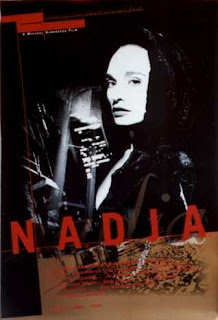Nadja is basically a remake of Dracula's Daughter, the 1936 sequel to the Bela Lugosi version of Dracula. The main changes involve the addition of twin brother Edgar, a much more reluctant vampire. But the movie isn't really about story but about style, atmosphere and mood. Firmly set in 1994, complete with a soundtrack by My Bloody Valentine and Portishead, it is shot in a combination of rather lovely 35mm black & white film and the distorted Fisher Price toy video camera known as Pixelvision.
Two of the main cast members, Elina Löwensohn as Nadja and Martin Donovan as Jim, are familiar from Hal Hartley movies of the period and Nadja shares a deadpan humour with his work.
The most inspired piece of casting is Peter Fonda, who plays Van Helsing as an aging acid casualty. Fonda is always a vapid actor, but that's completely appropriate to this role; in switching the character from the grey-haired fuddy-duddy of the earlier film into a long-haired hippie on a bicycle, it reinforces that though the "older generation" has changed it is always just as out of touch with youth, even when the "youth" in question is hundreds of years old. As with Dracula's Daughter Van Helsing has been arrested for the murder of Dracula, but as played by Fonda he seems seriously delusional and paranoid.
The rest of the cast is solid with the exception of Galaxie Craze as Lucy, who seems just as somnambulant before meeting Nadja as she is after falling under her vampiric spell. Susy Amis is particularly memorable as Edgar's nurse Cassandra, who turns out to be another of Van Helsing's children. David Lynch (who "presents" the movie, which is produced by his frequent collaborator Mary Sweeney) has a small role as a morgue attendant, but the movie owes little to his style.
Dracula himself appears in flashback, played by Bela Lugosi in stock footage from White Zombie. Lugosi is the iconic image of Dracula for most people, though I don't rate his performance (or the movie) at all. The images they've chosen are striking, in my opinion the best ever taken of Bela, though I suspect the main reason for them is simply that White Zombie is in the public domain while Lugosi's Dracula is not.
Writer/director Michael Almereyda seems completely unconcerned with coherence, and large patches of the movie are hard to figure out as the story leaps about (quite how someone on bail for murder manages to get from New York to Transylvania is glossed over). The overdone use of Pixelvision also obscures some scenes; sometimes this is striking, as with Nadja's psychic flashes of her father's death at the start, but more often it's annoying.
The lesbian aspect is played up somewhat; Dracula's Daughter was the first of many "vampire lesbian" movies. I'd like to say that it was more enlightened in its view of sexuality than the earlier movie, but despite almost sixty years of changing attitudes the movie still shows homosexuality as a predatory impulse to be "cured" or exterminated. It's also hard to see what the genuinely bewitching Elina Löwensohn sees in the uninteresting Galaxie Craze.
I found it hard to tell how much of the pretentious dialogue was intended to be a joke and how much was serious angst. I watched this movie probably half a dozen times when it was new, and though Fonda always amused me I think I took the posturing more seriously. Most of the "deep and meaningful" stuff basically amounts to a couple of wealthy goth kids whining that their privileged lives are unsatisfying. "The pain of fleeting joy" indeed.
Only sixteen years after it was made, Nadja has aged quite badly. Or maybe that's just me - it feels so much like a specific period in my life (and reminds me uncomfortably of a specific relationship). I can't say that I'd recommend it. It does make me want to revisit Poppy Z. Brite's vampire novel Lost Souls, which I was seriously obsessed with at the time, to see what I think of that now.
Here's the trailer.







Heh, that trailer looked pretty silly but then I watched the scene you quote above re: angst. That looked a lot sillier.
ReplyDeleteMind you, I spent my time during the two Hal hartley movies I've seen trying to figure out how much was supposed to be for laughs...
I saw this film back in 1995 - during the whole "first year of uni, getting enthusiastic about art films" type period - and loved it. Though I haven't seen it since, and I wonder if I liked it at the time because it was so affectedly weird.
ReplyDeleteMakes me miss the Rialto. It was a crummy cinema, but those were some times.